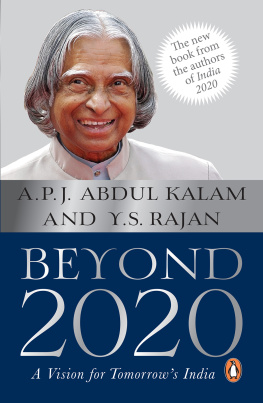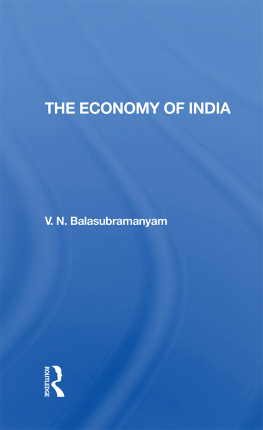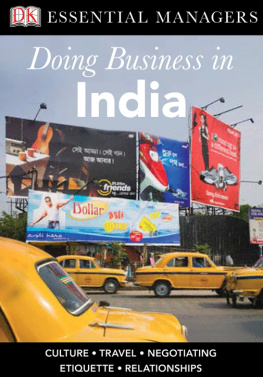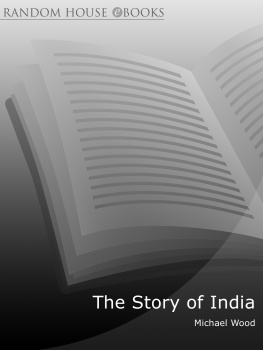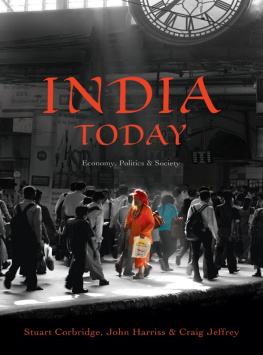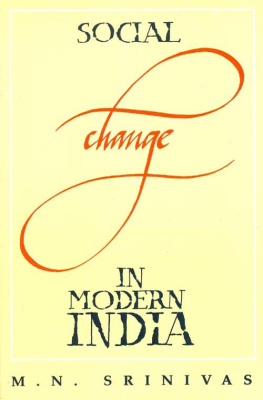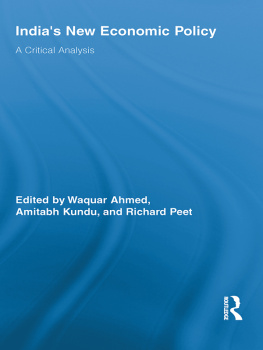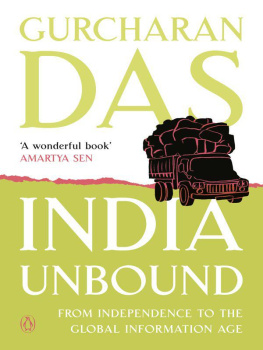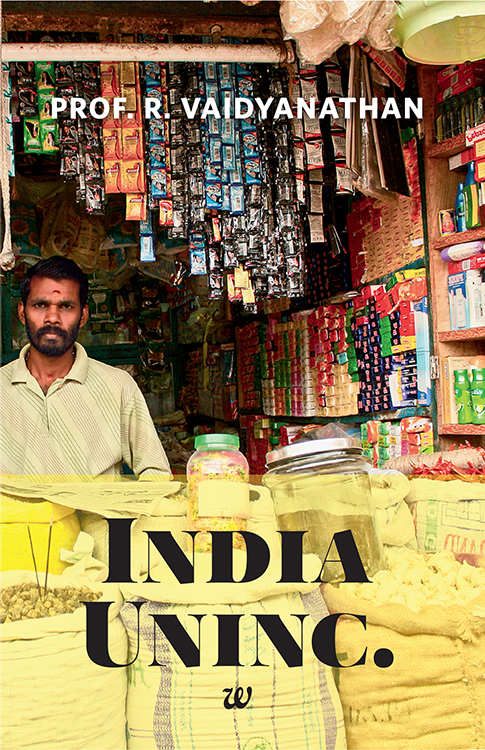
INDIA
UNINC.
Praise for India Uninc.
This book provides a much needed analysis of Indias vast non-corporate sector. Vaidyanathan offers an excellent overview of previous debates, and writes with clarity and insight on the trends and reforms that have touched this sector, how people within it cope, and what more needs to be done.
Nandan Nilekani, Chairman, UIDAI
Although, the Non-Corporate sector occupies a large space in our Economy, it receives little attention. This book brings out the travails of this sector in terms of poor credit availability and dealing with corrupt government agencies. It provides a new perspective to experts who are otherwise focussed on capital markets and those with access to organised banking.
Sucheta Dalal, Editor, Money Life magazine
At a time when Finance Ministers seem to think that attracting foreign investment is the only required reform, Prof Vaidyanathans book is a breath of fresh air. He is absolutely right in saying that the non-coporate sector in India is among the most dynamic, yet least known and most neglected of sectors. It urgently needs faster clearances, less red tape and more credit.
Swaminathan S. Anklesaria Aiyar, Consulting Editor, The Times of India
The beam of a searchlight on a sector we hardly look ata sector that, Professor Vaidyanathan teaches us, has been and can be one of the most powerful sources of growth in our country.
Arun Shourie, Former Minister, Government of India
The Non-corporate sector high share in national income, in savings, GDCF, in manufacturing /in service sector/in taxation, in credit off take etc. makes it an engine of our economic growth and hence regrettably not adequately focused Therefore, Professor Vaidyanathan has done yeoman service to the intellectual community by providing a recipe for rectifying the situation and this is timely.
Dr. Subramaniam Swamy, Former Commerce Minister, Government of India
Non-Corporate India makes up around 45% of our GDP and provides employment for the majority of our population. Sadly they are not part of any policy, left to fend for themselves and most often at the receiving end of the inspector raj and State tyranny! For the first time Prof Vaidyanathan has explained their existence in a lucid manner pointing out the need for good policy to enable their growth and contribution to employment.
T.V. Mohandas Pai, Chairman, Aarin Capital Partners
This book is from the other India perspectiveor the real India, the unknown India and the India that sustains the Indian economy and providing employment and livelihood to ten times the employment that organised private sector provides.
S. Gurumurthy, Senior Journalist
I would choose Indias next tryst with destiny is about the non-corporate sector. This book wonderfully synthesizes the puzzle.
Manish Sabharwal, Chairman, Teamlease Services
R. Vai dyanathan has established with surgical precision that the most dynamic elements in our society are small entrepreneurs who remain unsung heroes.
Jaithirth (Jerry) Rao
Too often, private enterprise is equated with the corporate sector. Numbers will show this isnt true and much of industry and service sector growth since 1991 has been driven by the MSME sector. Indias growth story is about unincorporated India. Professor Vaidyanathan should be complimented for bringing this sector and its three kinds of problems, entry, functioning and exit, into the discourse.
Bibek Debroy, Economist
INDIA
UNINC.
Prof. R. Vaidyanathan

westland ltd
61 Silverline Building, 2nd floor, Alapakkam Main Road, Maduravoyal, Chennai 600 095
No. 38/10 (New No.5), Raghava Nagar, New Timber Yard Layout, Bengaluru 560 026
93, 1st Floor, Sham Lal Road, New Delhi 110 002
First published by westland ltd 2014
First ebook edition: 2013
Copyright Prof. R. Vaidyanathan 2014
All rights reserved
ISBN 978-93-83260-56-0
Typeset by Ram Das Lal
This book is sold subject to the condition that it shall not by way of trade or otherwise, be lent, resold, hired out, circulated, and no reproduction in any form, in whole or in part (except for brief quotations in critical articles or reviews) may be made without written permission of the publishers.
Dedicated to the memory of my parents
Shri. S. Ramamurthy and Shrimathi R. Balambal
who imparted knowledge and culture to me
Contents
Section 5 Social Security for the Self Employed and
the Role of Gold
- Foolish Governments and Smart Women Role of
Gold in our economy
Foreword
I have known Prof. R. Vaidyanathan for nearly fifteen years. He did an exhaustive study on the Non-Banking Finance Sector a decade ago which was in a sense an eye-opener for many of us in the industry. The study established that the Non-Banking Financial Sector involving large companies and small moneylenders plays a very important role in the economy of India. The Non-Banking Finance Sector plays an important role in meeting the credit requirements of the small businesses in timely fashion at appropriate risk adjusted rates. He also showed us that a larger portion of credit requirements of sectors like trade, transport, hotels etc. are met by the Non-Banking Finance Sector.
While most of our discussions used to revolve around Non-Banking Finance Companies or NBFCs, Prof. Vaidyanathan enlarged the scope of his study by introducing the role of UIBs or Unincorporated (Uninc.) bodies like money lenders, chits etc. to consider Non-Banking Finance Sector or the NBFS as a whole.
Prof. Vaidyanathan has been associated with a number of regulatory bodies and also sits on the boards of many large corporates as independent Director. But he has retained his abiding interest in small and medium businesses and their financing.
Prof. Vaidyanathan is a prolific writer in business journals and magazines. He has consistently highlighted the role of non-corporate India as well as the non-banking finance sector of our Economy. He has also dwelt on the salient differences between the Indian Economy and that of US in terms of structure, employment, institutions, instruments and regulations. He argues that Indian paradigms need Indian answers and not solutions copied blindly from western text books.
In this seminal work, he brings out the salient aspects of the Unincorporated or Non-Corporate India primarily consisting of Partnership and Proprietorship firms, what is termed as the P&P sector.
He estimates their share in National Income more than 40% in savings/capital formation and employment. He explains that they occupy a significant part of the service sector and also have greater real growth rates. In a sense, they have been the engines of our economic growth in the last two decades. He argues that they occupy a fairly large space in our economy but get lesser attention due to our focus on the corporate sector. From that point of view he calls for re-focusing our reform process to facilitate the growth of these small and medium enterprises . India Uninc. is the victim of corruption and bribery by government agencies and lack of timely availability of credit at reasonable interest rates.
In that context, there is a need to reform regulatory and governance mechanisms at the state level. He also highlights the role of caste as social capital in some clusters of economic activity in India. It provides a refreshing perspective on the role of caste in capital formation, risk taking, facing failures and credit transactions with trust. He brings out the importance of a separate developmental and regulatory agency for Non-Banking financing entities which would go a long way in facilitating orderly and faster growth of the Unincorporated sector.


